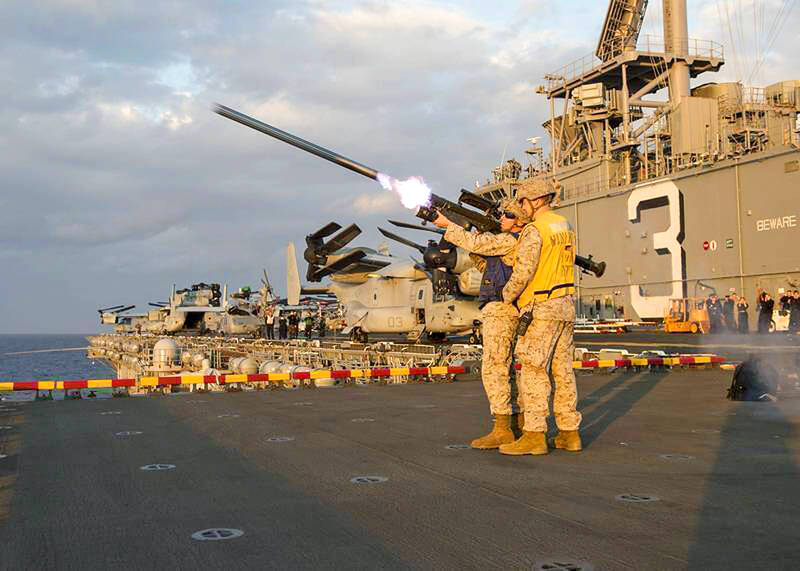The Ministry of National Defense-affiliated Chungshan Institute of Science and Technology is in the process of getting certified to assemble an additional 1,985 Stinger missiles on top of those from US arms sales, a senior defense official said yesterday.
Washington is to send a team to Taiwan to evaluate the institute’s manufacturing capabilities and information security, said the official, who commented on condition of anonymity.
The ministry initially bought 500 missiles for the army and navy, but later increased the order to 2,485 in response to an increase in Beijing’s military activities around the nation, and to meet the army’s urgent need for mobile weapons in large quantities to counter Chinese air power and drones, the official said.

Photo courtesy of the US Navy
If the institute clinches the certification to assemble the missiles, the nation would receive the missiles sooner than the delivery timeframe of between next year and 2031, they said.
Taiwan plans to issue Stinger systems to military and coast guard garrisons in the Pratas Islands (Dongsha Islands, 東沙群島) or the Spratly Islands (Nansha Islands, 南沙群島).
The ministry did not confirm or deny reports that the US has delivered some of the missiles in a recent security package.
The institute said it does not make policy, but would be glad to obtain the certification to assemble the missiles.
The Stinger air defense system is a single-soldier operable surface-to-air missile used to shoot down rotary and fixed-wing aircraft at a range of up to 4.8km.
In other news, the ministry said that defense contractor RTX Corp would pay back what Taiwan lost as part of the defense giant’s guilty plea to price gouging in US arms sales to allies.
Virginia-based RTX, an arms maker formerly known as Raytheon, produces Patriot air defense missiles and radar systems sold to Taiwan, among other governments allied or friendly with the US.
The US Department of Justice launched a probe into the price-gouging allegations and kept Taipei appraised of developments without being asked by Taiwan, the ministry said in a news release on Monday.
The department and RTX have reached a plea deal, with the latter promising to return unlawful gains estimated at US$959 million to injured parties, it said.
There is evidence suggesting that Beijing has promoted the news on Chinese-language content farms to spread skepticism about the US among Taiwanese, the ministry said, as it called on the public to be critical when consuming information.
“This case proves that the anti-corruption measures arms sales between Taiwan and the US are working,” ministry spokesman Major General Sun Li-fang (孫立方) told Public Television Service in an interview aired the following day.
The ministry did not disclose information about the case out of concern for the integrity of the legal proceedings, not to keep unfavorable news from the public, Sun said.
Democratic Progressive Party Legislator Wang Ting-yu (王定宇) said the scandal showed the ministry had not been transparent enough with lawmakers or the public.
The nation should develop an independent system to evaluate US-sourced arms procurements to avoid relying on Washington to uphold the fairness of the deals, even if the safeguards proved effective this time, he said.

TRUST: The KMT said it respected the US’ timing and considerations, and hoped it would continue to honor its commitments to helping Taiwan bolster its defenses and deterrence US President Donald Trump is delaying a multibillion-dollar arms sale to Taiwan to ensure his visit to Beijing is successful, a New York Times report said. The weapons sales package has stalled in the US Department of State, the report said, citing US officials it did not identify. The White House has told agencies not to push forward ahead of Trump’s meeting with Chinese President Xi Jinping (習近平), it said. The two last month held a phone call to discuss trade and geopolitical flashpoints ahead of the summit. Xi raised the Taiwan issue and urged the US to handle arms sales to

A magnitude 5.6 earthquake struck off the coast of Yilan County at 12:37pm today, with clear shaking felt across much of northern Taiwan. There were no immediate reports of damage. The epicenter of the quake was 16.9km east-southeast of Yilan County Hall offshore at a depth of 66.8km, Central Weather Administration (CWA) data showed. The maximum intensity registered at a 4 in Yilan County’s Nanao Township (南澳) on Taiwan’s seven-tier scale. Other parts of Yilan, as well as certain areas of Hualien County, Taipei, New Taipei City, Taoyuan, Hsinchu County, Taichung and Miaoli County, recorded intensities of 3. Residents of Yilan County and Taipei received

Taiwan has secured another breakthrough in fruit exports, with jujubes, dragon fruit and lychees approved for shipment to the EU, the Ministry of Agriculture said yesterday. The Animal and Plant Health Inspection Agency on Thursday received formal notification of the approval from the EU, the ministry said, adding that the decision was expected to expand Taiwanese fruit producers’ access to high-end European markets. Taiwan exported 126 tonnes of lychees last year, valued at US$1.48 million, with Japan accounting for 102 tonnes. Other export destinations included New Zealand, Hong Kong, the US and Australia, ministry data showed. Jujube exports totaled 103 tonnes, valued at

BIG SPENDERS: Foreign investors bought the most Taiwan equities since 2005, signaling confidence that an AI boom would continue to benefit chipmakers Taiwan Semiconductor Manufacturing Co’s (TSMC, 台積電) market capitalization swelled to US$2 trillion for the first time following a 4.25 percent rally in its American depositary receipts (ADR) overnight, putting the world’s biggest contract chipmaker sixth on the list of the world’s biggest companies by market capitalization, just behind Amazon.com Inc. The site CompaniesMarketcap.com ranked TSMC ahead of Saudi Aramco and Meta Platforms Inc. The Taiwanese company’s ADRs on Tuesday surged to US$385.75 on the New York Stock Exchange, as strong demand for artificial intelligence (AI) applications led to chip supply constraints and boost revenue growth to record-breaking levels. Each TSMC ADR represents